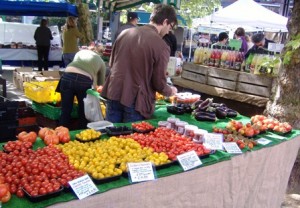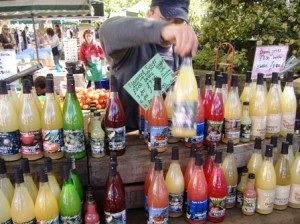- Plea from taxonomist to nutritionists and food people: use scientific names and get them right.
- Cooking writer doesn’t get the hint.
- New Scientist rounds up bunch of recent animal domestication studies.
- DIY bio-char; Muck & Mystery has some ideas.
- Diverseeds has videos of diverse seeds.
- “For one week, 2500 people from Noirmoutier use all their might to harvest this precious La Bonnotte potato by hand.”
- Barcoding bananas: useful for field genebanks?
A.B. Chapman Lectures in Animal Breeding and Genetics
I’m informed by DAD-Net that the A.B. Chapman Lectures in Animal Breeding and Genetics have been presented annually at the University of Wisconsis-Madison since 1994 by leading international scholars in the genetic improvement of animals, and that this year’s lectures were given by Prof. Miguel Angel Toro, Departamento de Produccion Animal, Universidad Politecnica de Madrid, Spain, on May 4 and 5. Prof. Toro gave two talks, on “Principles of Conservation of Animal Genetic Resources” and on “Mating Allocation in Genomic Selection.” Did anyone out there see them, in particular the first, either in person or live on the internet? Let us know. In any case, it looks like they’ll eventually be available for downloading.
Nibbles: Asparagus, Eels, ICT, Dingoes, Phoenix dactylifera, Apples, Bear-pit
- Liguria’s asparago violetto gets Slow Food treatment.
- “The bottom line is we just don’t know why they are struggling so badly.”
- Using mobile phones to treat plant pests and diseases in Uganda.
- Dingoes have positive effect on biodiversity.
- Date palm genome mapped.
- Boffins see the light, explain negative effect of fertilizers on biodiversity.
- Brogdale situation “better,” but for how long?
- Wait, Bern has a bear-pit?
Farmers’ market fails to market diversity
Wandering around London on Friday, we came across the Pimlico Road Farmers’ Market. A couple of dozen stall selling everything from fruits and vegetables to cheese to all kinds of meat products, mostly sourced locally, meaning within 100 miles of the M25, the motorway that goes all the way around London. Friendly people. Beautiful produce, beautifully displayed. All impeccably organically certified — signs to that effect were everywhere. Made artisanally, naturally, according to traditions which no doubt trace their origins back to the mist-shrouded times of, well, the last Tory government, probably. And yet, and yet…
Apart from one stall selling tomatoes

and another one selling apples and apple products

there was really no indication that agrobiodiversity was in any way valued, either by the sellers or buyers.
None of the stalls had more than one or two varieties of any of the fruits and vegetables on display. Ok, I thought, fair enough, we’re not dealing with a huge catchment area. But there was not even any mention of variety names on the labels. Maybe they’re all rather boring commercial cultivars and breeds, and the stall owners don’t want to draw attention to that fact. The European Union doesn’t make it particularly easy to grow heirlooms, as we’ve pointed out here before. And indeed a brief chat with a couple of stall holders did in fact reveal that none of the veggies on display were particularly noteworthy local varieties. Pity. It seems that the fact that produce is organically grown is an immeasurably more important selling point than its status as an ancient landrace, at least in this market in an affluent part of London, which I found surprising. I wonder if some enterprising student is making a study of all such markets across London.
Excellent pork pies though.
The end of the line for Egypt Baladi?
The controversy over the Egyptian pig cull is turning very nasty.
There are estimated to be more than 300,000 pigs in Egypt, but the World Health Organisation says there is no evidence there of the animals transmitting swine flu to humans.
Pig-farming and consumption is concentrated in Egypt’s Coptic Christian minority, estimated at 10% of the population.
Many are reared in slum areas by rubbish collectors who use the pigs to dispose of organic waste. They say the cull will harm their businesses and has renewed tensions with Egypt’s Muslim majority.
The Domestic Animal Diversity Information System hosted by FAO records only one pig landrace in Egypt, called Egypt Baladi, from بلاد which just means land or soil. “Baladi” means something like “of this land”. The pig has a long history in Egypt, but I can’t find any information on its genetic affinities. If the total cull goes ahead, will a unique, ancient landrace be lost forever?